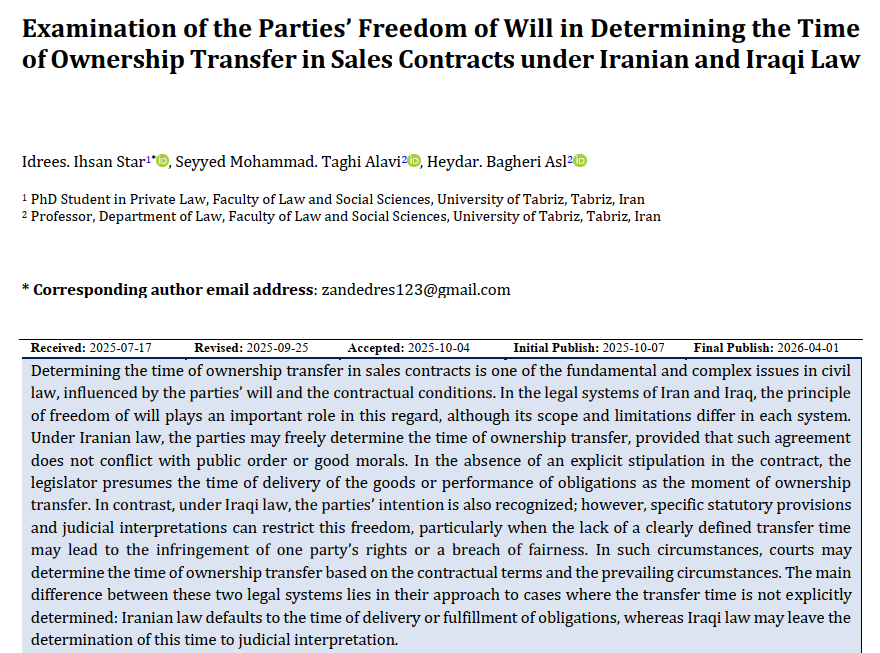Examination of the Parties’ Freedom of Will in Determining the Time of Ownership Transfer in Sales Contracts under Iranian and Iraqi Law
Keywords:
Comparative study, freedom of will, ownership transfer, sales contracts, Iran, IraqAbstract
Determining the time of ownership transfer in sales contracts is one of the fundamental and complex issues in civil law, influenced by the parties’ will and the contractual conditions. In the legal systems of Iran and Iraq, the principle of freedom of will plays an important role in this regard, although its scope and limitations differ in each system. Under Iranian law, the parties may freely determine the time of ownership transfer, provided that such agreement does not conflict with public order or good morals. In the absence of an explicit stipulation in the contract, the legislator presumes the time of delivery of the goods or performance of obligations as the moment of ownership transfer. In contrast, under Iraqi law, the parties’ intention is also recognized; however, specific statutory provisions and judicial interpretations can restrict this freedom, particularly when the lack of a clearly defined transfer time may lead to the infringement of one party’s rights or a breach of fairness. In such circumstances, courts may determine the time of ownership transfer based on the contractual terms and the prevailing circumstances. The main difference between these two legal systems lies in their approach to cases where the transfer time is not explicitly determined: Iranian law defaults to the time of delivery or fulfillment of obligations, whereas Iraqi law may leave the determination of this time to judicial interpretation.
Downloads
References
Abu al-Saoud, M. (2010). Analysis of Contractual Terms and Transfer of Ownership in International Sales.
Al-Abadi, A. (2020). Theories on the Transfer of Ownership in Specific Sales.
Al-Ansari, F. (2001a). International Sales and Transfer of Ownership under Comparative Jurisprudence.
Al-Ansari, F. (2001b). The Role of Contractual Terms in Transfer of Ownership.
Al-Qummi, M. (2000). A Comparative Study of Iranian and Iraqi Laws Regarding Conditions for the Transfer of Ownership.
Alavi, S., & Asadlou, J. (2015). Investigating the Differences in Family Law in Iran and Iraq.
Alizadeh, M. (2005). The Impact of Islamic Jurisprudence and Civil Law on the Iraqi Constitution.
Emami, A. (2020). A Comparative Study in the Law of Iraq and Iran.
Gha'em Maqami, A., & Abd al-Majid, M. (2015a). Investigating the Effect of Collateral Stipulations (Shurut-e Ziman-e Aqd) on Determining the Time of Ownership Transfer.
Gha'em Maqami, A., & Abd al-Majid, M. (2015b). A Jurisprudential Analysis of the Suspension of Ownership Transfer in the Contract of Sale.
Ghafouri, S. (2003a). A Critique of Suspensive Conditions in the Contract of Sale and Their Effect on the Transfer of Ownership.
Ghafouri, S. (2003b). The Jurisprudential and Legal Effect of Contractual Stipulations on the Transfer of Ownership.
Hammadi Al-Jubouri, H. (2009a). Impact of Contractual Terms on the Timing of Ownership Transfer.
Hammadi Al-Jubouri, H. (2009b). The Role of Contractual Freedom in Ownership Transfer in Iraq.
Hasani, R. (2023). The View of Imami Jurists on the Transfer of Ownership in the Sale of Generic Goods (Kulli fi al-Dhimmah) and its Application in Iranian and Iraqi Law.
Hejazifar, F. (2021). Investigating the Effects and Jurisprudential-Legal Features of Contracts and Their Role in the Transfer of Ownership.
Hosseini Lorgani, M. (2020). Sale and the Transfer of Ownership in Sale in Iranian Law, the 1980 Vienna Convention on International Sale of Goods (CISG), and European Law.
Ja'fari Langaroudi, M. (2002). A Critique and Review of Legal Concepts and Terminology in Iraq.
Katouzian, N. (2005). A Comparative Study of Ownership Transfer Laws in Iran and Iraq.
Khaki Nejad, J. (2022). A Jurisprudential-Legal Study of the Destruction of the Subject Matter of Sale Before Delivery (Talf al-Mabi' qabl al-Qabd) and Its Effect on the Transfer of Ownership.
Kheiri Jabr, M. (2018). How to Apply Rescission in the Event of Contractual Breach in the 1980 International Sale of Goods Convention, Iranian Law, and Iraqi Law.
Khorasani, M. (2021). The Effect of Sale Contracts on the Transfer of Ownership in Iranian and Iraqi Law.
Khosravi, M. (2023). The Effect of Delivering the Subject Matter of Sale on the Time of Ownership Transfer of Immovable Property from the Perspective of Article 62 of the Law on Permanent Programs of the Country's Development Provisions.
Mohammad, A. (2017). A Study on Conditional Sale.
Najafi, M. (2015). A Comparative Study Between Iranian and Iraqi Law on the Transfer of Ownership in Specific Sales.
Niknejad, M., & Naderi Samirmi, F. (2024). The Jurisprudential-Legal Status of Transactions Conflicting with the Buyer's Right in an Implied Sale.
Pilva, A., & Angouraj Taqavi, F. (2017). A Comparison Between the Principles of Islamic Jurisprudence and Civil Law in Iraq and Iran. 28-30.
Qanavvati, H., Wahdati, M., & Shabiri, A. (2000). A Comparative Study of Ownership Transfer in the Contract of Sale and the Laws of Iran and Iraq.
Qasemi Ahd, M. (2019a). Analyzing the Conditions for the Validity of Contracts and Their Effect on the Transfer of Ownership.
Qasemi Ahd, M. (2019b). The Effect of the Stipulation Option (Khiyar al-Shart) on the Transfer of Ownership in Sale Contracts.
Qasemzadeh, A., & Ghorbani Jouybari, M. (2015a). Legal Challenges and Obstacles in Determining the Time of Ownership Transfer.
Qasemzadeh, A., & Ghorbani Jouybari, M. (2015b). The Legal Effects of Ownership Transfer Based on the Agreement of the Parties.
Qasemzadeh, A., Rahpeik, M., & Kiyani, S. (2018). A Comparative Study of the Civil Law of Iran and Iraq.
Rajij, H. (2000). Conditions and Terms in Contracts: Their Role in Ownership Transfer.
Shahidi, M. (2014). Citizenship Rights and the Division of Powers in the Iraqi Constitution.
Vahedi, M. (2019a). A Comparative Study of Sale Contracts in Iranian and Iraqi Law.
Vahedi, M. (2019b). Investigating the Laws of Iran and Iraq Regarding the Time of Ownership Transfer in Sale.

Downloads
Additional Files
Published
Submitted
Revised
Accepted
Issue
Section
License
Copyright (c) 2025 Idrees Ihsan Star (Corresponding author); Seyyed Mohammad Taghi Alavi, Heydar Bagheri Asl (Author)

This work is licensed under a Creative Commons Attribution-NonCommercial 4.0 International License.





